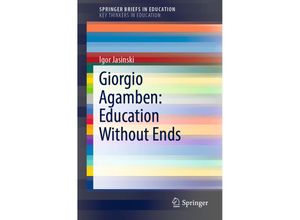Italian critical theorist Giorgio Agamben may be best known for his political writings
concerning the curtailing of privacy rights in the wake of 9 11 and the status of prisoners of
war and refugees. Yet casting him primarily as a political theorist is misleading given his
significant contributions to the fields of linguistics literary theory philosophy aesthetics
and religious studies. This book provides the first ever comprehensive introduction to
Agamben's work as it pertains to the field of education. Written in a clear and accessible
style Giorgio Agamben: Education without Ends is an invaluable resource for anyone interested
in thinking education beyond its current standardized forms. The first part of the book creates
a context by highlighting formative experiences in Agamben's biography that reflect a
particular idea of education on the threshold between life and work. The second part introduces
the notions of infancy study community and happiness and discusses their relevance with
regard to key issues in educational theory and practice. The third part shows how conceptual
constellations based on Agamben's work can inspire studious practices within the spatial
temporal and curricular infrastructure of educational institutions as they exist today.

